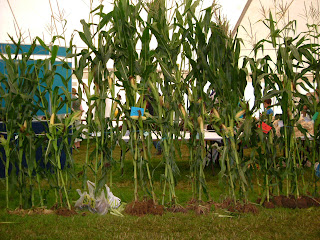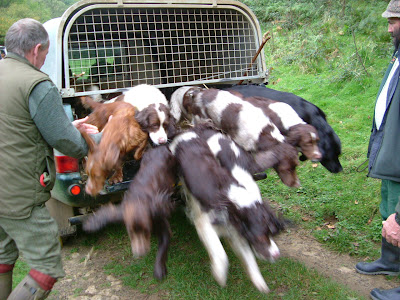I spoke to Mike about it. He thought it sounded like malnutrition. The chick, when first hatched, lives off the yolk sac which it absorbs into its abdomen as it hatches. We reasoned that the chick had drained these reserves and Gertie, who was too focused on hatching the other eggs, hadn't yet taken chick to the feed tray and taught it to eat. It was starving to death.
We had to intervene. Either we had to take the chick and raise it ourselves, or we needed to take the yet unhatched eggs away to push Gertie into caring for her chick. We decided to remove the eggs. Even as a first time mother, Gertie had a better chance than me of successfully raising her own offspring and teaching it how to be a chicken. It was motherhood or bust for her now.
I checked on the pair at regular intervals. I'm pleased to say that Gertie was taking charge of her little one, calling it to eat and dropping tidbits for it. There's a good chance for that chick. The eggs we removed all appear to be addled or infertile so it looks like we did the right thing.
As it was raining again this morning, I thought I would get on with chutney and preserve making. As I checked the cupboards for ingredients, I realised I had LOTS of out of date stuff in my pantry, but all things the birds like, so I figured I'd cook for them first. After all, they're going to need the extra energy now that the weather's turning. Here's a simple recipe for your wild birds:

Take some lard (UK) or empty that coffee can of grease (US) from your fridge. Warm it in a pan and add the dry matter.
Make sure it's pretty soupy - the fat holds it together. If it's too soupy you can always add more dry stuff later.

Fill it with the mix and put it in the freezer overnight.
When it's set hard, cut off the paper cup
Pop it in your fat ball holder and hang it in a tree, sheltered from the rain if possible. If you haven't got a holder, just put a long piece of string doubled to make a loop into the mix before freezing it. Hey presto! -

You can guess by the look on my face that I'm not crazy about touching fish. I'll gut any mammal you like but fish freak me out. Look inside a trout's mouth - all those rows of backward-facing teeth. It's not quite 'Jaws' but it's still not somewhere I want to put my hand.
I never did make any chutney. Maybe tomorrow.




 I know it's hard to make anything out in this picture but that's the point. Granted it is late afternoon so it's getting dark, but what's the excuse for having to wear a deerstalker, full length oilskin coat, scarf and wellie boots on the last summer bank holiday of the year?
I know it's hard to make anything out in this picture but that's the point. Granted it is late afternoon so it's getting dark, but what's the excuse for having to wear a deerstalker, full length oilskin coat, scarf and wellie boots on the last summer bank holiday of the year?



































